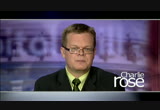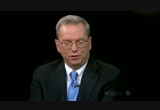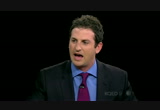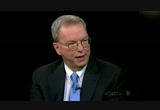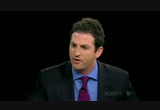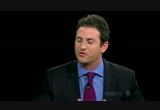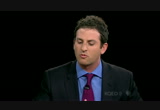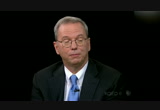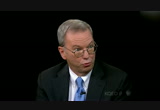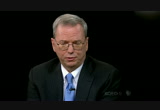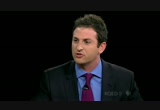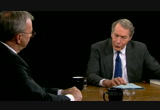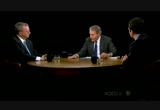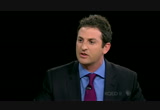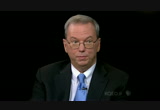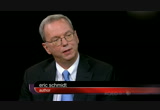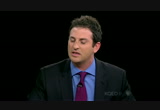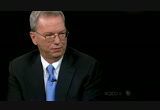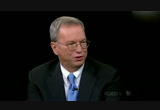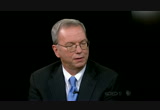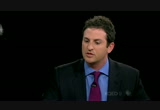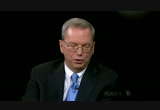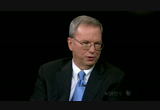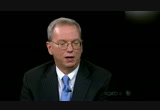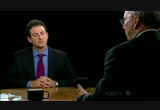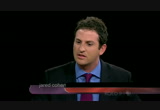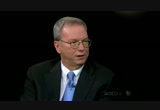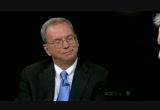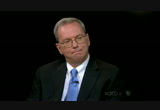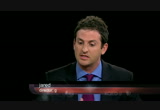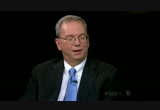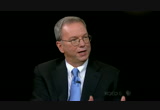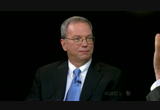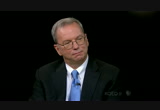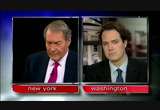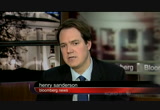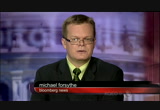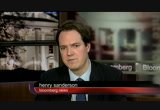tv Charlie Rose PBS April 27, 2013 12:00am-1:01am PDT
12:00 am
. >> rose: welcome to program, we begin this evening with the conversation about the new digital age, reshaping the future of people, nations and business with eric schmidt and jared cohen. >> the fact of the matatter is, you always have new technologist, we conclude in the book that the empowerment of people is overwhelmingly good from their perspective. you just have to have good answers to the privacy questions, the governance question, the trance national border question. >> we have more visibility into the chance that await us than any other time in history tri, these are really tough problems that await the next 5 billion people, you need every engineer, you need every thoughtful person and everybody who is currently studying and interested in the world to play their role in helping figure out how we troubleshoot, challenges and if we do well by the next 5 billion people we will have done by the vast majority of future users. >> rose: michael forsythe and henry sanderson, their book is
12:01 am
called china super bank, debt, oil and influence, how china developed a bank is rewriting the rules of finance. >> you know, we all know champion's economy recovered vick questionly after the global financial crisis one of the reasons this happened is because of the system of local finance set up all across china that we discovered in our research was actually invented and formulated by this bank back in 1998, by 2008 when things started to go wrong in the global economy, the entire country basically had this system of local finance set up basically shovel ready products, 25 trillion r and b, 4 trillion u.s. dollars worth of projects ready to go, many of those shovels actually hit the ground and the economy recovered quickly and helps keep the communist party in power if you can give the economic goods to people. >> rose: the new computer digital age and the china super bank, when we continue. >>
12:02 am
12:03 am
>> in the next few-s 5 billion people abscessed the internet for the first time, over 6 billion people already use mobile phones, the spread of internet and mobile technology revolutionizes the way we live but also raises many questions about the future of global power, terrorism and privacy, eric schmidt and jared cohen talk about the impact of the tech revolution in their new book, it is called the new digital age. reassessing the, reshaping the future of nations people and businesses. >> executive chairman and jared cohen the chairman of google ideas at this table, welcome. >> thank you very much, charlie. >> >> rose: but let me begin of why this book and why this collaboration and how this thing got started. >> you know,, the arrival of the internet has improved every country that it has been in, and no countries that are worse off, and in our collaboration, we concluded this is a really good thing if you care about healthcare and education, global
12:04 am
business, the arrival of billions of people have entered this and also concluded there are some warning signs and issues we wanted to talk about and take you through what could happen so we can anticipate those things and maybe come up with some solutions to them. >> rose: talk to me about how the two of you collaborated on this book. >> i mean who did what here? >> well, and we are really not just saying this because we both google docs played a very important role in this because you are work on the same document and type at the same time but we traveled together to close to 30 different countries, we have been friends for a little over three years, and it was a combination of e-mails, conversations, and it was a process by which we started by figuring out how do we actually both as a pair view the world today, and then we used that to try to determine what we think is going to happen when 5 billion new people connect, and so we would start with what the, with the problem we think keeps people up at night and what people are excited about and take that view and apply our thinking and kind of play it out
12:05 am
over the next decade. >> rose: did you bring different skill sets to the task. >> yes, jared is a much better writer than i am and i am a better technologist. >> and our daughter went with us to korea and served as our editor. >> th the new digital age, the title, where did that begin? with the internet? is it now just simply getting up to speed are we seeing it in its infancy or is -- >> we talked on this show before about moore's law and the changes in technology, and moore's law has another five, ten years to go and that's the doubling of performance every two years. and that means the technology falls in price very dramatically and the communications revolution so this is going to go on for a while, the other data point is the 6 billion people have mobile phones of which perhaps a billion are smart phones, and this new generation of smart phones are much, much cheaper than the ones we are all using today, as prices come down, those people
12:06 am
will want it as well. and when they get a browser, think about it all of a sudden they will have access in their own language all of the world's information, all of the entertainment, all of the ideas, all of the books, all in one place, for them it is a eureka moment. >> rose: what will they do with it and what does it mean to are for the rest of us. >> they will be busy educating themselves, entertaining themselves, the same we do today. >> in developing countries they have a corrupt police force and other problems we don't have, they don't get services because the government is inept, they can use this to solve problems but the biggest change is the consciousness and motivation and their wanting to improve things which will put pressure on their governments and what is interesting to this point, charlie, we were in myanmar and they have less than one percent of its population connected to the internet yet everybody has heard of it so what we realized from that trip is when you think about the next 5 billion people connecting they are actually
12:07 am
going to understand the internet as a set of values and as an idea but they are ever going to experience it as a user and as a resource. and that is powerful, north korea which only has one advertise n the whole country which is a car ad at the airport is the only country where the internet has not actually permeated the advertising market. and so it is the only exception to this observation. >> rose: so the idea of the new digital age, the new thing that is happening is the empowerment of individuals, we have never had this shift of empowerment to billions of people before, as this shift of empowerment occurs you have the good people being he empowered but also the bad people being empowered and in particular you have issues like the government being disempowered. >> and that sets up the tensions over the next few -- >> rose: that's what i want to get out of this. all of the things it is doing for us there are red flags you have to raise. talk about north korea, you went there with bill richardson were you on the trip? >> yes. >> north korea is a very strange place. in one sense it is a pretty city, the people were busy going to work, but on the other sense,
12:08 am
the sense that we got of no doubt, they were absolutely convinced what they were saying is right and the concept of another choice seemed impossible. we described pyongyang as a broadway play that the government puts on for foreigners and for the rest of the population it is more like the truman show to use a different example but what is different is behind all of the staging and behind all of the actors whether in the subway or at the university, they did actually give us a glimpse into what the technological proper looks like, so we went to the korea computer center for instance and what we learned is, the country is wifi capable they just haven't extended it, phones are 3 g capable, they just don't make data available for the population, they have 3-d television, they have unfiltered internet in some locations, it is kind of the ultimate example of digital corruption in the sense that there actually is a lot that is technological impossible it is all hogged but the unelected few. >> and i am under the impression that several years ago it was a
12:09 am
deaf tone if you would call with a cellphone. >> that is correct, in fact there was there was about a million mobile phones and part is to fit the government to turn on the power signal and this would connect the people there, we can't tell if they are going to but they were very opaque in their answers to us, they listened, and they clearly heard what we said, but whether they are going to do it, i don't know. if you are a dictator with that kind of thought control, would you take a risk that you would expose people to information that would ultimately get you thrown over? it is a key question for them. >> and they did seem aware though as they open up, for every cellphone that is added into this already tiny ecosystem you can't go backwards after that, so i think what makes them nervous just based on our observation is they are worried about reaching a point of no return where if they expand access to the extent that a critical mass is connected what that means for the longevity of their regime there is no religion, no competing faith there is no competing ideology
12:10 am
and there is no way for individuals to even question anything. and of course technology and the ecosystem can throw all of that upside down. >> you have made, you wrote the internet is one of the few things humans have built they don't truly understand, what don't we understand. >> the technologists people like myself think the internet is just connectivity and all of that, but human behavior is messy, human behavior is unpredictable, human behavior is not the rational acts according to the economists we are running a very large experiment here, which is very important, and that experiment is connecting everyone together. in our book we spent a fair amount of time speculating that governments will get tired of some of that connectivity and they will begin to actually vulcanize the internet because they get worried about this empowerment and the cross connection of power for legitimate and illegitimate reasons. >> and that paves the way for states that are like mined around either religion or norms or governance modelgetting the
12:11 am
web in clab race. >> iran not only announced it would have its own internet within iran but recently an announced it would have its own google earths iranian earth presumably that would not have israel on it, i mean it is ludicrous and yet this is the kind of thinking that is going on in these governments. >> rose: yes. what do you see overcoming that? >> well, one of the things -- >> rose: including the behavior of the governments. >> one thing is it is very difficult to take the country out of a country they get used to it and use it for commerce and part of their every day lives and everybody sort of depends on it, part is a little addicted as a country to the internet, it is very hard for the government to do the really nasty stuff, and the internet provides a pretty big insulation against sort of horrific government actions against large groups, against minorities because people will report it, even in china where they tried very hard to sensor the internet with their equivalent of twitter and facebook, they now have people who courageously are reporting environmental issues, terrible things going on with
12:12 am
the children and so forth and when you think about 5 billion new people connecting those are also 5 billion new witnesses, there those are witnesses that keep a check on a regime. >> rose: yes. >> and that can take many forms or take the form of individuals with smart phones catching an act of terror and rewinding the footage on their phone as we saw in boston, as we expect to see in other parts of the world, it can also take the form of repressive regimes may still bein willing to commit atrocities in the street but can't do it in a news blockout, still may choose to do it anyway but the era in which these things happen and nobody has visibility into it is getting very close to over. >> rose: what does boston say to you? >> boston of course is a terrible tragedy and these are evil people but to some degree it was a digital success, what happened was the government had some surveillance video, and they chose to release that and asked citizens to help, citizens put in lots and lots of pictures that they had taken with their own mobile devices and helped
12:13 am
them pinpoint the locations, even better, when the two perpetrators allegedly carjacked this guy, his phone was still in the car, and they followed the car to their -- to the point where also they have the firefight where the one fellow was killed. the fact of the matter is had the cellphone not be in the car they might not have been able to catch those people, at least at that time. >> rose: and they intended to go to new york. >> and again you can imagine maybe in the future people will, when their car gets stolen they will throw hair phone in the car so they know where it is going. >> rose: people in trouble they throw away the cellphone. >> and this is of course central to our comment about the future of terrorism it is difficult to imagine terrorists operating in the caves of tora bora, so they will be leaving a digital trail, now i imagine a terrorist who has committed an act and on the run, think about how careful they have to be not just with their physical activities but digital activities money in that situation can go through the checklist and make sure they are
12:14 am
doing everything competent perfectly at every moment, eventually they make a mistake and when they do there is literally millions of people with smart phones who are literally part of this digital manhunt. >> rose: pulling back from that, the essence here of this digital anal is there is more power with the individual than with the state. >> it is the democratization of information, we talk also about the demom mock station of manufacturing, of democratization of manufacturing, and individuals are empowered at the expense of traditional industries and traditional governments, that comes with some costs but it is overwhelmingly positive. >> rose: well the thing i am struck with as far as the shows i do about big dad and the presence of sensors and the possibility of sensors not just for the industrial world but the healthcare world of how you can gather new information you never could before and yo you have the capacity to analyze it. >> well, in the book we talk about -- >> rose: the mapping of the human genome and doing things way beyond that. >> in the book we talk about the
12:15 am
future of healthcare, in many ways it is tied up with your mobile device, your mobile device will have a little wifi connection and take a pill, that is approved by the fda wifi out from your body what is going on, trance dermal patches which .. which will watch what is going on with your blood and how is your heart and blood is doing, when they see something change, it calls the doctor and the doctor calls you and says get yourself in the hospital. >> rose: is that today or -- that is today. >> in fact there are many startups in our industry that are building these medical add ons and this is probably the largest new growth area for medical spending, new healthcare, and frankly preventative medicine. >> rose: do you think there is a climate in silicon valley that is different than anywhere else in the world? >> in terms of innovation, of. >> rose: a cultural climate. >> in terms of innovation there is something different in the bay area. >> rose: what is it? >> it is something about infinite possibilities, there
12:16 am
has been a repeatable model here of evincing the future and enough to be able to see it and drive it, young people coming out of research labs where they just bill these companies. and i he it is going to happen again. >> rose: let me go to privacy. and in terms of invasion of privacy, not the fact that everybody has a cellphone and you have less privacy already because people can take your picture wherever you are and a lot of us know how that works. but in terms of the invasion of privaciful privacy because of the data that is available to everybody. >> so our view is, when you think about privacy and security and when we sat down to write this book we wanted to write about it in a way that was more broad than the first 2 billion so it became interesting to go to places like saudi arabia and myian under and tunisia and see what they thought about privacy and security and this led to us having a view that it is .. it is the ultimate shared responsibility, companies have a role, governments have a role and individuals have a role, our view is us being connected in the future it doesn't remove the importance of good judgment, and
12:17 am
that starts as young as kids are starting to play around with iphones and tablets and androids, et cetera. >> jerry do you actually have a new rule for parents. >> so my view and i should say i am not a parent yet, but as somebody who one day will be one my view is kids will live their lives online faster than their fiscal, physical maturity will allow for so parents will have to talk to their kids about online privacy and security literally years before the birds and bees is relevant. think about this connecting us and when we go back to, it is a one-way street, right, this connectivity of the whole world, this shared responsibility applies to people, it is important to recognize that the stuff you are posting about yourself when you are 16 or 21 or whatever will be around forever, there is no delete button. >> rose: right. >> it is also important. >> and the cloud is too. for companies it is important that companies have a sort of sacred responsibility to protect people's data, so the data doesn't get used. and
12:18 am
governments have a responsibility to understand the limits of transparency, where it should be private, where it should be public and. >> rose: suppose you are a terrorist and you mean to do evil things because you have some self defined aggrievement. >> there is to way to restrict that. >> we came to the view that you probably can't stop the uni bomber situation where you have a gentleman than who is basically crazy, who is sitting in a shaq in montana who is using the postal service and does not leave any digital tracks. but the training, the recruitment, the proselytizing of these people who started off probably as reasonably normal people and end up being terrible people we can probably watch that now and probably, government can sort of see that, you can detect it and get ahead of it. >> i don't know krn if it does any good, al a with ally can i he was preaching to the converted and recruiting simply
12:19 am
through the internet, it was a place for him to spread the ideas he was using, you can argue we do ott have a vested interest in suppression of ideas, we ought to have better ideas but -- >> let's just try to give these people multiple choices. the people who are being radicalized. >> in every case you have somebody who is not very well educated, has a lot of energy and they have somebody who is religious or over them teaching them hate. there is no question if we just show them some other choices, get them to use the internet for entertainment and train them a little bit, build education, we are going to end up with a better output. >> in fact, some people will argue that part of the arab spring came from people realizing that authoritarian states simply not only eliminate any opportunity for dignity but also they saw that the rest of the world was doing a lot better than they were. >> yes. absolutely. i think on this question, and i think what we are really concern about is violent radicalization.
12:20 am
>> when somebody goes from radicalized to violently radicalized there is a steps that follow, police interrogate somebody who they believe is involved in something that could lead to a violent terrorist attack it used to be maybe they got information and maybe they didn't and now they have a sim car so how networked future terrorists will be any link in the chain makes a miss mistake professionally or socially it begins to unravel the entire thing so we heard an interesting example when we interviewed a few navy seals for this book where they talk about a senior al qaeda commander in pakistan who they have been following for some time and lost track of. he had been very careful professionally on his phone, had tossed isim cards and had no problem picking up a phone and having a 40 minute conversation with his does nine afghanistan who he was looking forward to attending his wedding, that was a mistake and led to his capturing and they get the sim
12:21 am
rd and everybody in his network. >> rose: why did he think about that. >> he made a mistake, nobody can be flawlessly careful, digitally or physically. >> and osama bin laden's case, he was ultimately can captured and killed because of the actions of his driver. and people worked very hard to get that information so we had a combination of extremely good detective work and a mistake, that is true for 100 years, now with the digital trail it is much easier to leave that trail without knowing it if you are a bad guy. >> rose: where are we going with the internet in terms of when you look at, we used to ask this question all the time we do the interviews and we started 15 yearyears ago what is the next g idea? what is the next big idea? >> today the next big idea is the one from the last few years. >> rose: mobile. >> mobile, local, global,. >> rose: local, local, global. >> define each of those. >> what happens is, you have mobility in the sense that people are moving from personal
12:22 am
computers to tablets and handheld devices if you look at the most recent financial result it is pc industry is struggling and the tablet and the mobile devices are ebb exploding with use and that is going to continue for some years. literally billions of handsets being sold. with local people are now living in a local world, local to where they are so you can imagine these phones that are highly personalized and this is with your permission and all of that saying, eric you need a new pair of jeans, the jeans are here on the right, the ones on the left are cheaper but you prefer this one on the right, that kind of suggestion is possible because the phones are so local. and global in the sense that you are dealing with probably sets of information that can be data mined you can learn new and interesting things, meet new people, when you travel, you can say, you know, here you are, these are the things you will find most interesting. and google's products you can see google now is trying to, for example, anticipate things that you might want to do and it dust it -- >> rose:. >> it understands enough of your patterns.
12:23 am
>> rose: right. >> that for example if you -- >> rose: what you lying. >> and make some suggestions for example how long the transit time and if you choose to you can program it with the things you want it to pay attention to or ignore it. and that is probably the right model going forward. the eventually way in which these systems evolve is they become perfect helpers, so in the book, we talk about how the world sort of divides itself in which humans do well which is judgment and fun and knowledge and so forth and computers which have a perfect memory and very good at searching for a needle in a haystack problem, so in a thousand things show me something that is different here and maybe that is interesting to me and maybe it is not, find something that is unique here. >> rose: how is search changing. >> search will move from the current search where you type something in to better anticipatory search, based on where you are, make suggestions, if you allow it and it sees you are busy booking an airplane ticket, it can remind you how long it takes to go to the
12:24 am
airport and it can anticipate give you a warning, these kind of helper things is the primary evolution of search for the next while. >> rose: what is google ideas do? >> so we look at the next 5 billion people connecting to the internet, surprise, and the unique sets of challenges that they face given that they live in parts of the world where there is conflict, instability or oppression and we try to build products that help address those challenges, whether it is exposing mapping and disrupting, narco trafficking networks or human trafficking networks or looking at how we get people in places like iran an opportunity to access unfiltered intern. >> and you take that information and create entrepreneurial opportunities or -- >> what we typically do is we work with people who are on the ground addressing these challenges, and understand what they look like, but don't necessarily understand the technology piece so it is the ultimate partnership between engineers and local experts into talk about the illicit networks. >> is shocking how big these
12:25 am
networks are. >> if you look at illicit networks, drug trafficking, human trafficking, hundreds of thousands of lives and it is all intertwined and turns out when you get engineers involved to look at this, they don't see the side that puts human trafficking in one box and marco trafficking in another box, they are saying, well, it would seem to me that if we had a lot of different data and we could visualize it in a way that showed correlations between how they are working with each other you would be able to identify trends that would help you play less of a whack a mole game. >> rose: part of this in listening to you guys feels like this. we all know how great the internet is, here comes eric and jared they are going to tell you howie you have to look out for that you need to raise this flag about the future. >> i think that is fair. >> rose: that is fair, whether -- in all the ways people wish us evil, who encompass evil, who
12:26 am
want to do bad things to their own people, who want to keep their own people from entering 21st century. >> but this is not a new narrative, this has been true for all the technologies, this is just the one that is affecting our generations that are alive today, the fact of the matter, is you always have issues with these new technologies. we conclude in the book that the empowerment of people is overwhelmingly good from their perspective. you just have to have good answers to the privacy questions, the governance questions, the trance national border questions. for example, new entrepreneurs and jared speaks a lot about this in the 5 billion, we will figure out all sorts of clever ways to solve their problems, the corruption problem, the tracking problem, when we were in libya we met with school children, schoolgirls, in fact used google earth to map where they should go to avoid the hey toe bombing. so you think google earth matters? they are alive. right? people use these tools to get -- >> rose: her not for please
12:27 am
area but survival. >> and our view on this, when you think about silicon valley, they produce phenomenal products that are used all around the world but the most innovative use places will come from places that are repressive impoverished and ridden with all kind of chance, we talk about how people will do more with less, the simple way to think about this, people in iran will read the instructions manual to their mobile phone, because it means something different to them, if they learn all of the different functionalities then it may actually be something that gives them access to civil liberties they may foot otherwise have why they don't use blue tooth uh but call and complete text complete strange displerz one of you say will is a possibility of the loss of leadership in statesmen, what is that about? >> well when we look at the arab spring, one of the lessons learned is you see the accelerated pace of movement making and so the era in which you had the walesas and emerging
12:28 am
as leaders and then later public figures it doesn't look the same in the context of the arab spring. they are producing. >> rose: tunisia and -- >> exactly so you get these individuals who emerge as kind of celebrities of the revolution, but they don't necessarily have the ability to run for president when and then deliver and technology, so technology doesn't replace the need for real leaders and doesn't replace the need for real institutions, our prick hundred, prick hundred is over the next predictions in the next .. middle east north africa you will see a number of this new generation emerge as real leaders and you can imagine in a decade when they are all running for president the population goes back through yo youtube and back to the footage and contrast the arab spring credentials. >> we went to tunisia and talk talked to the various bloggers, set himself on fire and the bloggers talked about it and it went off. >> rose: because google what he could do -- >> and he became a symbol of the open regs from the dictator.
12:29 am
this particular dictator was a very thorough dictator, except in the case of the internet. he managed to sensor television and radio and the print and so forth, so this kind of unrest was not generally recognized. the internet was the integration point that the bloggers who had been work fog are a while to get it out used. we worried that future dictators will figure out sophisticated ways to appear to keep the internet open but make sure that this kind of dissent does not get out. things like internet filtering technologies and other forms of censorship. in libya, the dictator in this case, qaddafi did the same thing and did not allow the internet at all, in fact, we met the fellow whose name was bread whose job was, crossed over the border at night and he turned it back on, right? courageously in our view, to get the internet in there, and had the connectivity existed not been there, the groups that were in the benghazi and tripoli and the others would not have found each other and formed a union against the government.
12:30 am
if you look at syria, syria because of the civil war shut off the internet to try to block the communication among the rebel movements, it gives sense of how powerful it is. >> rose: let me revisit the whole question, on the one hand you have the possibilities of people trying to restrain the internet, on the other hand, new tech following has always preceded a pace. how is this question going to be settled? is it simply the inevitability of progress will overcome the effort to suppress? >> well, we would argue that you can not put the internet back in the box, whatever analogy you wish, that the internet is here to stay, that every society, including north korea will use it, that it will -- since it has an empowerment agenda for individuals it will empower people in ways, and we worry that governments will come up with ways to disempower the now empowered people in that sense it is a race, in the western world, the democracies and the -- >> rose: why would they be able to do that? why do you think governments will be able
12:31 am
to -- >> the example is an evil dictator can decide you can use the internet but every phone you have will have tracking software that will report exactly what you do to a complete state and completely censored internet and complete log of everything you do, various forms of those proposals have been in place in various of these countries. if they were to synthesize that whole thing you could end up with a police state that would be quite ferocious. >> of course the dictator's dilemma in the future is add an element of some optimism here, is that if you look at a population that has smart phones as opposed to a population that doesn't they will proliferate identities, they are going to have -- plus facebook account, youtube account so the virtual population will actually exceed the physical population so that is a lot of activity online and so for a dictator in the future, they are going to have a very difficult time distinguishing between what is real and what they need to worry about and what is noise. and ultimately, their problem will be when they miscalculate by underreacting to something because it got drowned
12:32 am
out by the noise or overreacting. >> rose: what is the status of hacking today? >> it continues, i think by this you mean beth sort of individual hacking but also state sponsored. >> rose: china. >> china, that kind of stuff. >> rose: the u.s. government in the last several days announced what it will do to try to thwart it. >> this problem always existed in computing, when i was a young programmer we talked about this, it is not a new fact, it was originally a sport, it now has become quite severe and of course criminal, criminal and not okay. what happened with google, of course is that china or china's sponsored agents within china attacked google and we ultimately moved to hong kong so we could sort of parley, partly in protest because partly we were unhappy with the censorship, there have been quite a few attacks by chinese agents, element of their army or funded by their army in the united states looking, what appears to be intellectual property and sort of proving that they can do it. they also use it to suppress or follow dissidents and people who they view as a threat to the
12:33 am
regime. there is evidence that other countries are doing this, in particular russia, iran, programs a few western europe countries, it is widely rumored that america has done some amount of this which i don't know personally. so the fact of the matter is that it is not just a china game, although china get all the attention. >> rose: how is google doing in china? >> well, because of our movement to hong kong the chinese government is not very happy with us. and it was sort of a free gift if you will to our competitors in mainland china who have continued to do well, we continue to operate there, we continue to make good money there, but the chinese remember having arbitrary ability to shut goes through these gate ways called fair walls and they can say we don't like you for example you tube is not allowed in china nor is facebook because they don't want competition against wavo and their competitors. >> cyber warfare, cyber terrorism, especially cyber warfare, the president underline the challenge this nation is threatened with.
12:34 am
>> of course what is interesting is you have people talking about what they describe as a cyber pearl harbor in one conversation and you have people talking about a future 9/11, and the reality -- >> rose: by the way it was leon panetta before the senate. >> and our view and what we write about in the book is what we need to be fearful of is a coordinated attack that is both cyber and physical, so you can imagine situation in the future where a cyber attack takes out the electricity of a city which makes it easier for terrorists to conduct a physical attack and that is what the real fear is. in terms of -- >> rose: and how real is the threat? >> >> the issue of the vick bring is the number one priority for the for the people who are looking at this, we are so dependent on the electric grid. >> and you saw inklings of what it can do even though it was not cyber after sandy. >> that is correct, many people are looking to harden the vick grid, a similar project is around the banking system because if the banking system were to clams. so the critical infrastructure
12:35 am
as you know is being beefed up very, very strongly in many of the countries, including the united states, i think we are going to be beyond that as a threat reasonably soon. >> on cyber warfare the observation is the states will do things to each other in cyberspace they would never do in the physical domain and what we don't know is what the limit is, and at what point is a cyber, state sponsored cyber attack so significant it warrants a physical world response. what you see for instance china doing is testing the waters. they keep going a little bit further and a little bit further and part of that is they are seeing how far they can go, they are being careful about it but every time they do it they setting precedence for states like iran and others. >> rose: the united states and the forward movement of technology, and specifically china, is it closing, is the gap, closing, narrowing? is china getting much better because of a full-court press to develop their own technology? >> china is investing very heavily in these areas, areas,
12:36 am
at the chip level, at the network level level, for example there is a called called waway which is run by a former army commander which is extremely successful globally, you can imagine how the chinese would use that if they wanted to, many chinese manufacturers that are effective because their cost of manufacture is low, they don't have quite the concept of software capability in the united states, nobody else does except maybe israel. >> rose: can they hire it? >> they can build it overtime, but they have to change their educational system, this he have to train people to think like software people and they are working on it. so in the next decade or two, i think it is fair to say that china will have caught up, right now -- into in the next decade. >> in the next decade or two. >> 2013 now, by 2035 -- >> what are the implications of that? >> well, one is numeric, there are simply more chinese people than there are americans. >> rose: sure. >> so their economy, by 2035 the gross gdp of china will exceed
12:37 am
that of the united states and on a per capita basis and so port. so at the current growth rates which we don't know it will maintain china will be a very formidable power as a technology innovator, not to change the subject but one is they have such a strong commitment to education and it is important for americans, very proud of what we have accomplished to recognize that it is a competitive environment and we need to have the kind of systems that produce the kind of education and high quality technical education that you see in the asian model. >> rose: i mean, there is a real commitment in computer science but also a commitment to create two great universities i think by 25th. >> that is correct, 2050. >> correct. most of the technological proper is not yet been built, 57 percent of the world is living under autocracy and as the states come online there are two options you can build an open system or a closed system and there is a very short list of supplier nations at which china and the u.s. are two examples, so who builds the next
12:38 am
generation of technological infrastructure? has serious implications for who has the cyber influence in the future. >> rose: and the internet, by the way, was originally designed under a u.s. principles of openness. >> rose: right. >> many countries complain about the openness and freedom you find on the internet. imagine if the internet had been designed and invented in the chinese model where it was by design hard to communicate, and in particular hard to communicate criticism and so forth. you would get a very different outcome. >> i mentioned education and your eyes kind of twinkle when you talk about education. >> of course. >> rose: what is technology going to do for us in the way we educate people and is it slower than we imagined? >> well, the educational institutions of our country change incredibly slowly for many, many reasons. >> rose: name one good one. >> well, i will just give you some reasons involving incumbency and lack of competition to start with. lack of evaluation. et cetera. there is hope, however, coming from the internet. there are a number of countries,
12:39 am
online countries, i am for example on a cad. >> and a guest that has been on your show. the core idea of the con fad you invert the classroom, teachers a very important and what the teachers do is they supervise the doing of homework in the classroom and the students do the video watching at home. and in the classroom, they have the game, vocation of learning, so students who are, you know, having funny way, they compete with each other for prizes and so forth and they have remarkable results, especially for remedial learning, which look like they are going to stand up in the test of time. so the great things about the internet is it attacks all sacred cows so in this case we have a real test whether the traditional classroom model that all of us true up with, can it be replaced or altered by this other model, and we will know and know it scientifically. and parallel -- >> rose: go ahead. >> and i was going to add in the u.s. we have a real experiment going on, even more important is what the internet is doing for
12:40 am
places with i have never had textbooks, so here is an example. you have cell phones with no internet at all. you can take these microsd cards which everyone -- and put programming and textbooks in those little cards and distribute them to cellphones and people can read on their cellphones, that is the base case. the next case is we get tablets and we have courageous americans who are busy funding inexpensive tablets full of local language education, even the tablets don't need a network an they teach and deal with early childhood reading in the local language and have the connect 50 and imagine if they have an internet connection what they can learn, are gone from knowing almost nothing just what the local tribal leader has told them to all of the information translated in 100 days is a heart attack. >> rose: and they can visit every museum. >> of course. >> and see things they would never have seen their lifetime. >> and i can assure -- these people are just like us. >> rose: exactly. >> they are trapped in these old systems, give them the tools, the smart ones, the creative
12:41 am
ones, energetic ones think of the explosion. >> rose: that is the question of how it changes. and think about how low the bar is in some parts of the world, we went to pakistan as part of the research for the book and there you have kids that show up at school, the teacher doesn't show up half the time when the teacher does show up i it is a ramshackle building and being taught rote people station and all of a sudden, you give them a mobile device and a smart phone that has interesting content on it plus it is a cool gadget, it is rhett yeaz, to understand what wins in that situation. so in a lot of respects we view the next 5 billion environment as having technology really inject critical thinking in the environment where it doesn't exist. >> rose: i will leave you with this question. start with you, jared. what do you hope people reading in in this book will come away with in terms of ideas about the future or, b, some sense of stimulus to action? >> we have more visibility into the challenges that await us than any other time in history, these are really tough problems
12:42 am
that await the next 5 billion people. you need every engineer, need every thoughtful person and you need everybody who is currently studying and interested in the world to play their role in helping figure out how we troubleshoot chance and if we do well by the next 5 billion people then we will have done well by the vast majority of future users. >> we are building this world. whether we like it or not. and often people don't understand the role they are going the play so the way you design a system, the way you think about it, the kind of information, each of us is shaping this new world. it is important to understand the good and the bad and balance it. >> rose: right. >> what i would smai is we hope this book really describes both. that it is a pragmatic view, a practical view of what is going to happen over the next decade. >> rose: it is amazing, in fact, our early idea, two things, number one, what are the possibilities for the internet, i mean for a young kid born in africa today, where there is no school, no infrastructure, no access to healthcare, that
12:43 am
because of a little phone will be able to understand the world like he never imagined, on the other hand, there some it could be asia or the middle east is born and because of a whole range of circumstances as may have happened with these two brothers in boston, they become emboldened to do something evil, they can find ways to use the internet. >> we can talk to these people now in a way we couldn't before. connectivity to everybody also includes being connected to the evil people. maybe we can invent ways as we think about these problems to get to them before they do something really terrible. >> rose: well said. eric schmidt and jared cohen the new digital age reshaping the future of people, nations and businesses. thank you. >> thank you. >> rose: thank you, jared. back in a moment, stay with us. >> the development bank was
12:44 am
massive infrastructure project that have become synonymous with the rise of china, also played an important role in increasing china's global influence, it helped bank roll the regime of hugo chavez with loans up to $40 billion and also lent more to africa since 2001, than the world bank, chen juan runs the bank, princeling son of one of the eight immortals that helped build china as we know it. we join from washington from two reporters from bloomberg's beijing bureau, the authors of this book, china's super bank, oil and influence how china development bank is rewriting the rules of finance, henry sanderson and eric schmidt, i am pleased to have them here to talk about this, help me understand how the china bank is underwriting, is rewriting the rules of finance. >> >> we decided to look at this bank, because we see this bank as the real power behind china
12:45 am
state capitalist system but many peopleave focused on the past two years, and it is really helping rewrite the rules because it is 100 percent state owned and unlike western banks it lent a huge amount to countries, developing countries where western banks haven't lent very much to, such as venezuela you mentioned, china development bank has lent over $40 billion. it also lent a lot of money for infrastructure in africa as well as resources and also money to central asia and russia, so it is really taking quite a different approach to western lenders and helped chinese companies span across the money to get deals, contracts as well as oil. >> rose: other than the fact that lending money is their business, did they lend it to venezuela and russia and some other countries because of their desperate need for oil? >> >> that's right. so china
12:46 am
developed bank is a policy bank, tasked to carry out the policies of the chinese government, one of those policies articulated about a decade ago is try to secure resources for china, and so these loans made to venezuela started in 2008 and to russia have really helped secure these resources for china, it is something they deemed important, of course you could buy some of these energy resources on the open market, but they wanted to make sure that they had the -- china wanted to make sure they had a strong supply, a steady supply of these resources and china development bank was the tool that actually made this happen. they did the tough negotiations, and that is not to say they don't make money from this. you know, they do charge interest rates on their loan, the loans, you know, for what we know are being paid back in oil for loans. >> how does the china development bank differ from other development banks around the world? >> >> i think the difference is the united development bank, united development bank has been around
12:47 am
for a long time. the difference is we have a state and institution that is just much bigger in size, in our book we say it is the biggest policy bank in the world by some degree, and also it is really the first time that, you know, a one-party system like china has flexed its financial muscle around the globe, not many countries have used a bank in this way. >> rose: and what about africa? tell me what it is getting from africa. >> >> in africa we look to two segments in our book, on the one hand they are trying to shift manufacturing there china to africa, because labor costs are rising in china, so they figure labor will be cheaper in africa and also africa has a great supply of raw materials, one example we looked at is leather in ethiopia, they have a great supply of leather but it has had no share in global manufacturing for decades, china thinks, with china's own experience in manufacturing they can shift some of that to africa, help africa industrialize and help chinese companies find new
12:48 am
markets for their products. and in africa, like in venezuela, china development bank is helping bet oil supplies through couns suchs ghana, which have just discovered oil and is not traditionally an oil power in africa flew. >> profit extending the power of the chinese state across the globe and many see its power at home. talk about cementing its power at home. >> about three quarter of the loans, a little more than that, actually go inside of china, and so, you know, we all know china's economy recovered very quickly after the global financial crisis, one of the reasons this happened is because of the system of local finance set up all across china that we discovered in research was actually invented and formulated by this bank back in 1998 by 2008, when things started to go wrong on the global economy, the entire country basically had this system of local finance set
12:49 am
up, basically shovel ready projects, 25 trillion, so over $4 trillion worth of projects ready to go, many of the shovels actually hit the ground and the economy rebounded quickly, that helps them stay in power and keeps the communist party in power if you can deliver the economic goods to people. >> rose: there is a feeling that in the united states that is, what is essential now is for china to put some pressure on north korea, there is some evidence that they are unhappy with what north korea is doing, how do you think they will play their role here? >> i think what we have seen in china, you know, after the nuke testing there have been many editorials and in state media with a real sense of frustration about china supporting north korea and essentially not getting much in return. and where, whether china should support north korea but officially we haven't seen much change in the stance, and i was actually up on the north korea border just the other week and you could see the trade was
12:50 am
still going on pretty normally every day, trucks were crossing the border with consumer goods, field construction material and i think that really highlighted the fact that north korea relies on china for a lot of its trade, and it can be quite difficult for china to cut that off. >> rose: but, therefore, it ought to have serious and persuasive powers and leverage with north korea? >> precisely, if they wanted to, they could cut off north korea's economy, you are right and when i was at the border you can see how much trade, 70 percent of the trade from china to north korea goes through this border point and china is the biggest supplier of fuel and other essential things to north korea, so china could cut off supply. >> rose: one of the things that has handball because of this the united states has put a significant new weapon system in terms of defensive weapons especially in asia and many believe that the chinese, you
12:51 am
know, are not happy with that, but they live that north korea has created that problem for them. >> oh, re. you are absolutely right. this affects china's interests. so north korea's behavior is causing this buildup, you know, with japan, the united states and south korea so people we have talked to said well now, north korea's behavior is affecting china's interests in a negative way so that they should, you know, do something about this. a lot of things that happened between north korea and china obviously happened under the radar as with any country. even more so with china and north korea because of the relations between the countries, can runs are not handle at a diplomatic level but between a communist party to communist party level by the international creed of the communist party is driving north korea so we don't know what is going on, there is obviously a very, very long military relationship between the two countries, they were allies during the korean war and so we haven't seen really a
12:52 am
shift yet in policy that you can discern. it might be under the radar. >> rose: mike, how do you think that the leaders will be differently. >> the user is out. certainly what we can say is his speaking style, at least his public persona is very different from his predecessor, tao, when he became a general secretary in november, he gave a very -- a very interesting speech upon his accession, he wasn't using the language of a communist party member. he was talking like a politician, you know, that you may see in another country. he wasn't using the standard phraseology we were expecting. same thing happened in march. and certainly, you know, he has a spouse that is very visible, so we have seen this difference in visibility, and also one thing that is actually interesting about him is he is a princeling lichen yun he comes from a revolutionary family, his
12:53 am
father was well -- one of the founding fathers, a high minister early on in the republic. so there are some people who say that those people have a greater sense of responsibility, or they have a greater sense of duty to keep the communist party going strong, to reform the communist party so it will stay in power, they have more skin in the game, there is what people have told us, some experts including voluntary gull at harvard university, these people really may have more of a stake in keeping the party viable. >> rose: they also, if that is true, may want to reform it so that it is sort of stronger at its core and eliminate as much corruption as possible in order to sort of get more stability to their control over the communist party. >> >> that is right. you know, they need to -- if they want to stay in power, they obviously want to have the economy continue to grow, they want the people happy. you
12:54 am
know, it is obvious one of, obviously one of the toughest jobs in the world to be a leader of china, it is not an easy thing, china is becoming a far more complex place, a far more complex place than ten years ago when huh engine too came into power, there is a lot more interest groups .. with a lot more money at stake, so governing china always has been a challenge and is certainly a much more complicated issue now i think for the new leadership. >> rose: will there be political ambition coming out of the economic power? >> surely that is one thing we found during this week book, you know, interestingly, the bricks, brics, brazil, russia, india, china, they had a meeting in, and they want to form a bric bank, and the head of china development bank has really been push forget this and there is even some articles he might be involved in this new bank. so i think we can see from this huh brics bank there is a desire to set up a different kind of
12:55 am
institution to represent perhaps the different political grouping, other than the western world. >> rose: thank you, thank you henry, thank you, michael. the book is called china's super bank, debt, oil and influence, how china, at china, how china's development bank is rewriting the rules of finance. thank you, guys. >> thank you. >> rose: thank you for joining us. see you next captioning sponsored by rose communications captioned by media access group at wgbh access.wgbh.org
1:00 am
auto . this is "nightly business report" with tyler mathisen and suzy gharib. brought to you by -- >> the street.com. interactive tools foor an ever-changing world. our dividend stock adviser helps guide income at a period of low-interest rates. we help you invest and trade stocks. action alerts plus is a charitable trust portfolio that provides trade by trade strategies. online, mobile, social media, we are the street.com. >> finding growth. the economy expands, but some say it's not fast enough. what it all means for you. >> big mac. how mcdonald's sees the broadest economy. >> social investing. why using social media to
84 Views
IN COLLECTIONS
KQED (PBS) Television Archive
Television Archive  Television Archive News Search Service
Television Archive News Search Service  The Chin Grimes TV News Archive
The Chin Grimes TV News Archive 
Uploaded by TV Archive on

 Live Music Archive
Live Music Archive Librivox Free Audio
Librivox Free Audio Metropolitan Museum
Metropolitan Museum Cleveland Museum of Art
Cleveland Museum of Art Internet Arcade
Internet Arcade Console Living Room
Console Living Room Books to Borrow
Books to Borrow Open Library
Open Library TV News
TV News Understanding 9/11
Understanding 9/11

